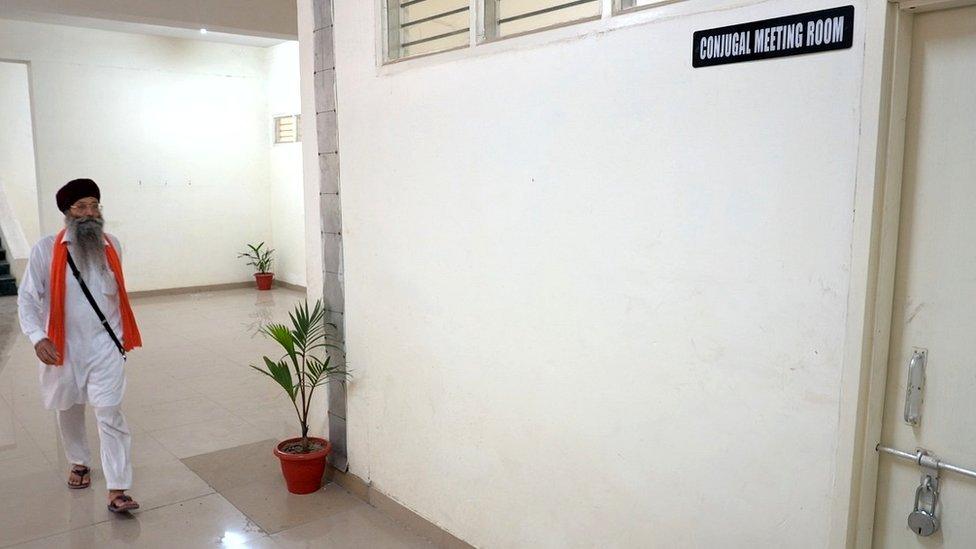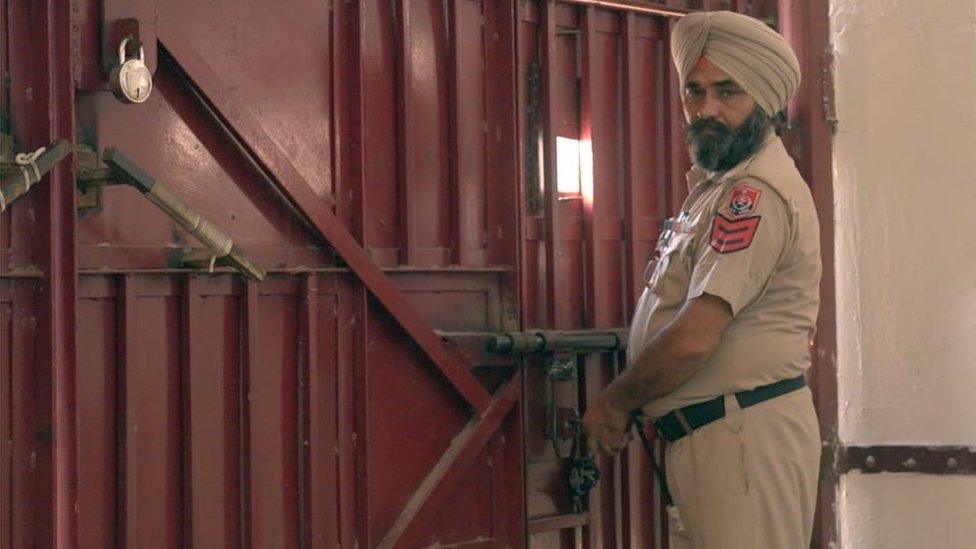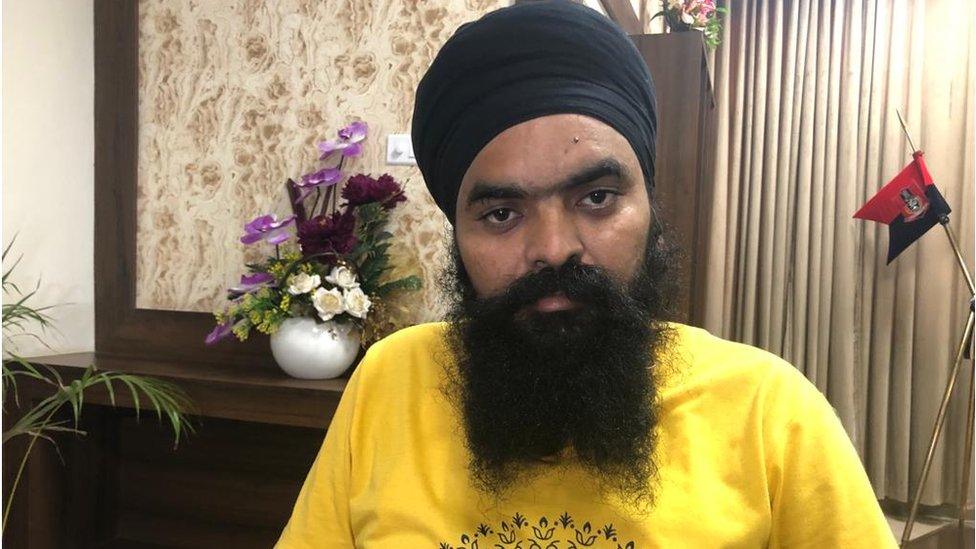Punjab: Hundreds enjoy new conjugal visit rooms in India jails
- Published

Prisoner Gurjeet Singh recently became the first Indian prisoner to be allowed a visit from his wife
The northern state of Punjab recently became the first in India to allow prisoners conjugal visits, and a 60-year-old murder accused was its first beneficiary.
Gurjeet Singh, who has been lodged in Goindwal Jail in Tarn Taran district for the past few months, told the BBC that he was "lonely and depressed" in jail and that he felt "a great relief when I was allowed to meet my wife and spend a couple of hours with her in private".
The meeting came after prison authorities in Punjab said inmates who exhibited good conduct would be allowed visits from their spouses for two hours every two months.
Since then, authorities told the BBC more than 1,000 prisoners in the state have applied for permission for such visits and nearly half of them have already happened.
In some Indian states such as Rajasthan and Maharashtra, prisoners who maintain good behaviour in jail are allowed to stay in open prisons with their families and courts across the country have often allowed prisoners leave for "procreation" or to "maintain marital relations", says Supreme Court lawyer Sunil Singh.
But a majority of the more than half a million prisoners in the country can go for years without being able to meet their spouses, he adds.
With the launch of the new scheme last month, Punjab became the first Indian state to allow such meetings inside jails.
Starting with three of the state's 25 jails on 20 September, the scheme was expanded to cover 17 prisons by 3 October. Officials say the remaining jails are too small to provide the facilities and one is meant for children.
Jails participating in the scheme have been asked to set up a room with a bed and an attached bathroom to allow a couple some privacy - the government order says a married couple is allowed to have sex and, in some prisons, condoms are also provided.
Senior prison department official Harpreet Sidhu told the BBC the decision "was taken to keep the stress levels of inmates in control and to ensure their re-entry into the society" and that "conjugal visits for sexual intercourse fulfil a basic biological need".

Goindwal jail in Punjab became the first in India to allow conjugal visits
Many countries, such as Russia, Germany, France, Belgium, Spain, Philippines, Canada, Saudi Arabia and Denmark, and some US states allow conjugal visits. Brazil and Israel even allow same-sex partners.
"But prisons in India do not allow inmates any physical contact with visitors on jail premises," says lawyer Amit Sahni.
In 2019, Mr Sahni filed a public interest petition in the Delhi High Court asking for conjugal visits to be made a fundamental right for prisoners since it's "a person's basic human right".
"It's perfectly natural for a couple to want to hold hands or hug when they meet, but they have to hold back since the meetings are held in the presence of prison officials."
Also, Mr Sahni says, "it's okay to punish someone who has committed a crime, but what about the spouse or the partner who is innocent? Why is her right being taken away?"
His petition is still being heard, but time and again, prisoners and their spouses have approached courts in India, seeking parole for the purpose of "maintaining marital relations" or "procreation" and in many of the cases, their plea have been granted.
In 2018, the Madras High Court allowed a 40-year-old convict serving a life term in Tamil Nadu's Tirunelveli district to visit home for two weeks for the "purpose of procreation". The judges even went to the extent of saying that conjugal visits were "a right and not a privilege".
Mentioning reports of "innumerable cases of HIV-Aids in jails because of sexual intercourse in between the same gender", the bench suggested setting up a committee, external to look into jail reforms.
And in 2014, Justice Surya Kant of the Punjab and Haryana High Court allowed conjugal visits and artificial insemination for inmates.
Justice Kant, who is now a Supreme Court judge, said in his order that the right to procreate was a fundamental right for prisoners, but added that the state could regulate it "and deny it to a category of convicts".

Prisoner Joga Singh said meeting his wife made him happy
The Punjab order says priority is to be given to those who have had a long stay in jail without parole and also specifies the categories of prisoners who are not allowed conjugal visits. They include:
High-risk prisoners, gangsters and terrorists
Those jailed for child abuse, sexual crimes or domestic violence
Prisoners suffering from infectious disease like tuberculosis, HIV or sexually transmitted diseases unless cleared by the prison doctor
Those who haven't been carrying out their duties properly for the past three months
Those who haven't shown good conduct and discipline, as determined by the superintendent
At the high-security Goindwal jail in the Tarn Taran district, close to Pakistan border, Superintendent Lalit Kohli, who approves requests for conjugal visits, says that once a couple is inside, the door is locked from the outside as the guidelines mandate that all windows and other exit points are blocked and secured.
"A couple is allowed up to two hours, but we have usually seen that most spend about an hour. In case they need any help, they can ring a bell to summon a guard," Mr Kohli said, adding that the scheme has been a hit with the inmates.
Joga Singh, 37, an undertrial accused of cheating, said he had been "emotionally upset" because of not being able to see his family for months, but was a bit reluctant initially to ask his wife for a visit since he was worried about how the prison staff would treat them.
"But it went well and the meeting has made me happy," he said.
Critics of the government order, however, say prisons are meant for punishment and allowing conjugal visits hurts victims and their families.
Charan Kaur, mother of murdered singer Sidhu Moosewala, recently accused the Punjab government of setting up "beds" inside cells and "providing too many facilities to gangsters in jail" after one of the 18 men accused of her son's murder fled from police custody.
Jail officials deny the accusation - they say the men arrested for the Moosewala murder are not eligible for conjugal visits since they are gangsters.
Advocate Amit Sahni says conjugal visits should now be extended to all jails in India and that it will be a great step toward reforming prisoners.
"The purpose of justice is not just to punish prisoners, it's also to reform them, so that once they are out, they can reintegrate into the society."

Read more India stories from the BBC:
